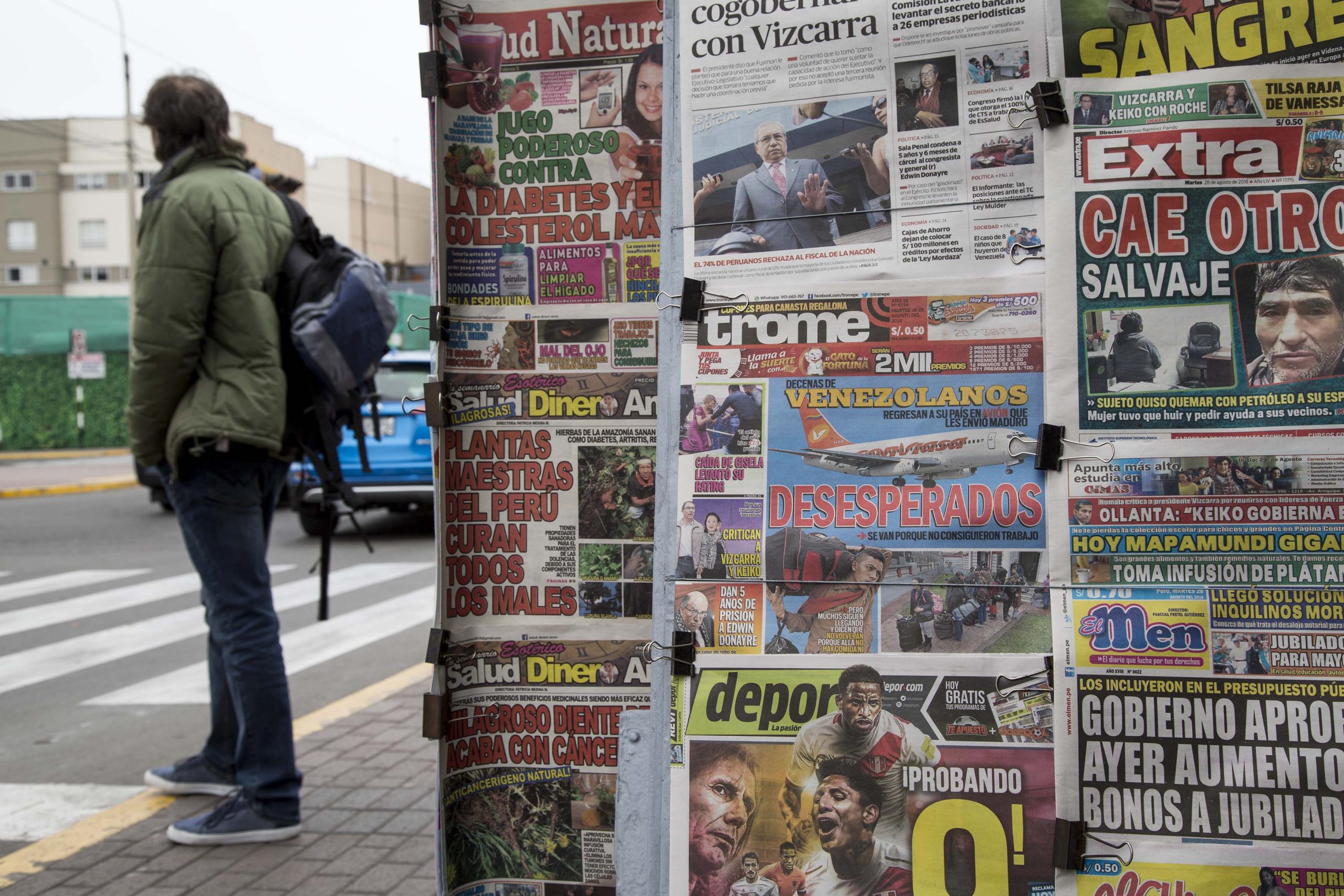Xenophobia towards Venezuelans on the rise in Peru
Venezuelans fleeing the dire situation at home face an increasingly hostile welcome in Peru, where parliamentary candidates recently campaigned on promises of tighter border controls.
Author:
27 February 2020

Carlos Eduardo Pino Simoza is a wiry man who has been forced into a state of hypervigilance. During conversations, he continuously glances over his shoulders and treats everyone with suspicion.
The 29-year-old former police officer fled his home in El Tigre in Venezuela because of the unfolding crisis in that country. He travelled through Colombia and Ecuador and finally settled in Peru, a journey many other Venezuelans made as life became increasingly difficult in their home country.
Simoza experienced daily taunts and endured the slurs directed at him. But his awareness of his surroundings and suspicion of most increased after he was stabbed during a xenophobic attack in Peru.
“When I arrived in Trujillo [a coastal city in the north of Peru], I went to a mall with some Venezuelan friends. The first thing I heard there was, ‘Fuck you, veneco’ [a derogatory word for Venezuelans and Colombians in Peru],” Simoza said through a translator.
“After that I was regularly called maldito [another derogatory word], veneco de mierda (fuck you, Venezuelan), etc. I basically just accepted it. They gave us dirty looks all the time,” he said.
After some time in Trujillo, two men on a motorcycle confronted Simoza in an alley while he was on his way to a pharmacy. “I went in and came back and they said, ‘Bandito veneco’. I said, ‘How ignorant it is of you to just say these things,’ and I called them idiots,” he said.
“As soon as I said that, one of them got off the motorbike and he intimidated me and then I hit him. I was trained to fight so I had to defend myself. After hitting him, I turned around to get myself out of the situation. It was then that someone stabbed me. That is the worst that has happened to me in Peru,” Simoza said.
Asylum seekers
A report that human rights organisation Amnesty International released in February said an estimated 4.8 million people have fled Venezuela in recent years, with Peru experiencing the largest number of Venezuelan asylum seekers.
Amnesty International condemned Peru for betraying its “example of solidarity and safe refuge” to Venezuelans and instead “resorting to restrictive policies”.
Related article:
Amnesty International Americas Director Erika Guevara-Rosas said in the report: “Peru seems to be repudiating its previously humane approach to Venezuelan people seeking protection. Changes to asylum practices and procedures at the Ecuador border appear to amount to a deliberate and unlawful policy of rejecting new arrivals from Venezuela.”
The report said there were nearly 380 000 Venezuelans seeking asylum in Peru, and more than 800 000 Venezuelan migrants.
‘Erecting barriers’
Despite Peru’s attempts to restrict Venezuelans from entering the country, Amnesty International emphasised that it wasn’t the only country in the region doing so. “Between June and August 2019, Chile and Ecuador also imposed similarly restrictive measures, limiting access to their territory and to regular status. Representing a principal corridor of movement for Venezuelans, Chile, Ecuador and Peru should refrain from erecting barriers and instead should prioritise responsible regional coordination, informed by a genuine commitment to upholding international protection obligations as well as the principle of responsibility sharing.”
The intergovernmental International Organization for Migration (IOM) recently released its Regional Refugee and Migrant Response Plan for Refugees and Migrants from Venezuela, which examines the unfolding humanitarian crisis facing Venezuelans in South America.
Related article:
The report found that a number of Venezuelans entering Peru had endured long journeys and required urgent medical attention. The majority of those entering Peru, however, would not be able to access the public health system because the asylum permit granted to Venezuelans is not recognised as a valid document for accessing healthcare.
It said there was an increasing number of Venezuelans experiencing discrimination and harassment in Peru. “With stretched resources and increasing number of arrivals, the risks of mounting discrimination and xenophobia is increasing. Over 35% of Venezuelan refugees and migrants interviewed in Lima reported being subjected to discrimination based on their nationality,” the IOM report says.
Increasing violence
There have been a number of reports of increasingly violent xenophobic attacks on Venezuelans in Peru. The xenophobic attitudes that have become the norm in some countries – inflamed by politicians such as Donald Trump in the United States, Viktor Orban in Hungary and Narendra Modi in India – and are prevalent in others have taken root in Peru as well.
In the run-up to its parliamentary elections in January, many Peruvian politicians on the right attempted to stoke fear, distrust and panic towards certain groups of people, including Venezuelan immigrants and LGBTQIA+ people.
In September, Venezuelan Minister of Foreign Affairs Jorge Arreaza spoke out against the increase in discrimination and xenophobic attacks on Venezuelans.
Related article:
“These are shameful and inhuman acts, permitted or committed by Peruvian government authorities and encouraged by hate campaigns against Venezuelans,” he was quoted by Reuters as saying.
“Venezuela denounces the Peruvian government for violating and neglecting its international responsibilities by promoting and allowing acts of segregation and xenophobia,” said Arreaza, adding that various “racist” governments in the region were working with Venezuela’s opposition.
No work
Denise Adriani, 37, worked as a teacher in Maracay, west of the capital city of Caracas, in Venezuela. Like so many of the Venezuelan migrants and asylum seekers in Peru, she faced regular discrimination from Peruvians when she arrived.
“My first plan was to go to Chile, but my best friend came to Peru and stayed here. She said it was fine but my experience was very different to hers … My story is different because I started to sell food in the street. The people sometimes told me that they won’t pay me because I am an immigrant,” she said.
“I worked in a restaurant and I was paid 12 soles [about R54] a day. She told me she can’t pay me more because I was from Venezuela and I did not have my PTP [temporary stay permit]. But when I got my PTP, she still refused to pay me more.
“The first month here, when I tried to find a job, they said they don’t hire Venezuelan people. One time, when I sold food in the street, a man attacked me physically. In that moment the other people tried to defend me. That man said, ‘Go back to your country,’ and grabbed me and dropped me to the street. Fortunately, the other people stopped him. That was a very scary moment,” Adriani said.
Adriani, whose father, three brothers and two nephews still live in Venezuela, said she sent the majority of her salary back to her family. When she decided to leave Venezuela and travel to Peru in search of a better life, she tried to convince her family members to travel with her but they decided to stay put.
Related article:
“It is hard because I know right now my brother just eats once a day. My youngest brothers, they sometimes pass two days of not eating. It is hard for me to stay here because my friends told me to come here, but my family decided to stay,” she said.
“They said, ‘You have the degree, you know how to talk English, you have more advantage than us. You have to go because the family needs that.’ I don’t stay here because I want to. I stay here because my family needs it and it is hard. I’m alone here,” she said through tears.
Discrimination
Like Adriani, Robert Wentzel Sanz Espinoza, 27, left most of his family in Venezuela when he fled his hometown of Aragua to travel to Peru. He also sends money home to assist his family but has less of a desire to return to Venezuela.
Espinoza used to run a business selling computers and now works at a school in Peru, where he assists with IT and administration duties. Unlike many other Venezuelans, Espinoza has done relatively well to avoid harassment, discrimination and xenophobia in Peru. But he has had some trouble accessing certain services because of his nationality.
“I haven’t really been affected by it. But the xenophobia affects almost all the Venezuelans. I tried to rent an apartment in Peru, but the owner didn’t want to allow us to rent the apartment because we were Venezuelans. We had our payslips and we have good jobs,” he said.
People like Adriani and Simoza remain hopeful of returning to their homes one day. Simoza said: “I’m really angry about the situation. I feel like my dignity has been taken away from me.
“We are here because we need to be here. We don’t want to be here, we have to be here. If you ask any Venezuelan, do you want to stay here, they will tell you they want to go home,” he said.




